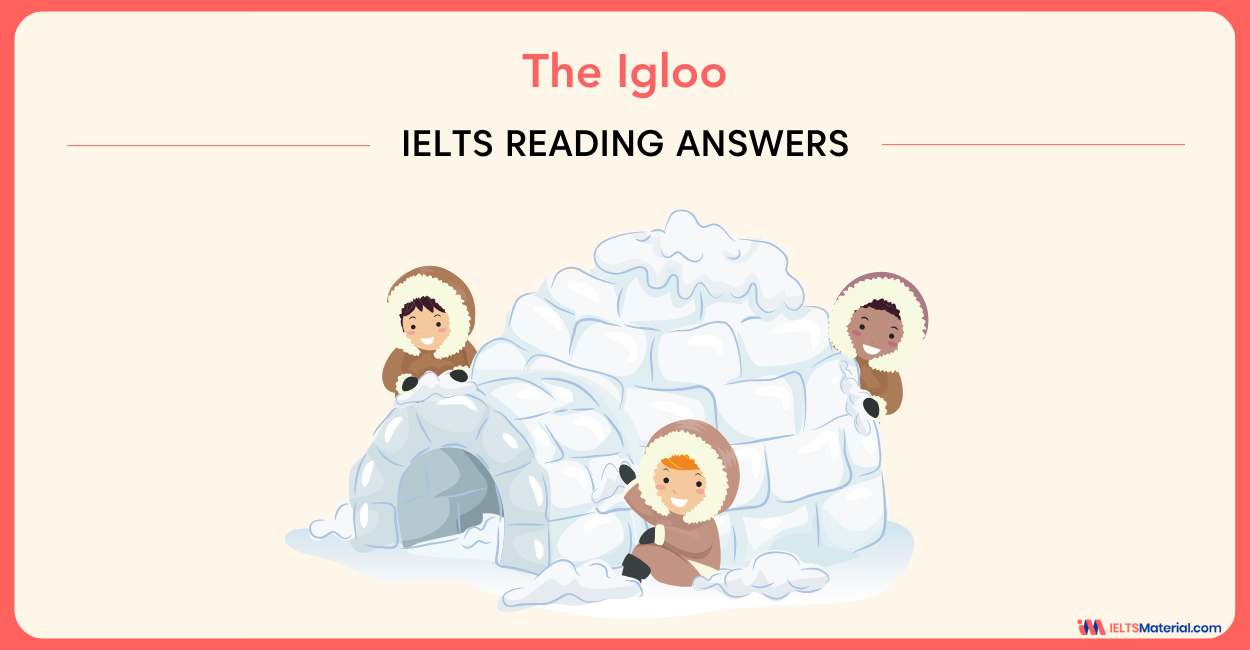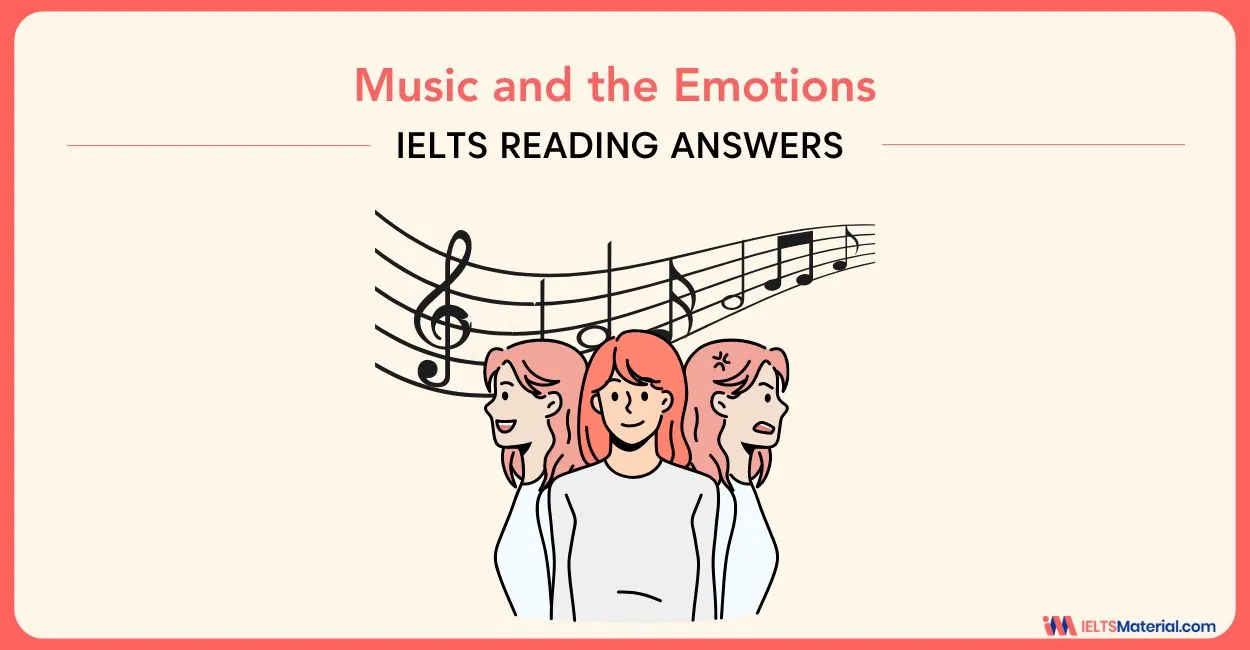Music and the Emotions Reading Answers
Looking to prepare for IELTS Reading Section 3? Check out the IELTS Reading Passage on ‘Music and the Emotions’ and level up your preparation with tips for different question types and take a step closer towards a band 8+ in the IELTS exam.
Table of Contents

Limited-Time Offer : Access a FREE 10-Day IELTS Study Plan!
In the IELTS Reading, it is necessary to practice different question types to level up your preparation and take you closer to your desired band scores. With the passage on Music and the Emotions Reading Answers, you will be able to do a targeted study. Therefore, familiarize yourself with the different strategies which are used in various question types in the IELTS Academic Reading. Since the questions would be from Section 3 of the Reading Module, you will understand how to approach this section to score a band 8+. With diligent practice, the Reading Module can be the top-scoring category for IELTS aspirants in the IELTS exam.
Shall we start now? Let’s check out the passage, Music and Emotions Reading Answers, together!
Types of Questions in Music and the Emotions Reading Answers
To acquire a band score of 8+ in the IELTS Reading Section, it is suggested to look into the strategies for each question type before diving into the IELTS Reading Recent Actual Tests. There are 14 questions from the passage, Music and the Emotions, which consist of different question types and are presented in Section 3 of the Reading Module.
- IELTS Reading Summary Completion (Q. 27-31)
- IELTS Reading Multiple Choice Questions (Q. 32-36)
- IELTS Reading Matching Endings (Q. 37-40)
Not sure how to answer IELTS Reading Matching Sentence Endings questions? Check out the video below for the latest tips and strategies!
Get the Comprehensive IELTS Reading (Academic) Band 8 Preparation Course and level up your preparation for the IELTS exam.
Tips to Solve the Question Types in Music and the Emotions IELTS Reading Answers
Now that you have the answers and explanations for Music and the Emotions Reading Answers, let’s explore some IELTS Exam Preparation Tips for Band Score of 8+ while answering the three question types. As you prepare, remember to focus on utilising certain question specific tips for a higher band score. This will help you enhance your reading skills as well as build confidence as you attempt the Reading questions in with Academic or IELTS General Reading.
Summary Completion:
Summary Completion requires you to fill in a gap in a paragraph with a word or phrase from the passage. To answer summary completion questions, you can use the following strategies:
- Read the sentences carefully: This will give you an idea of the type of word or phrase that is missing. Understand the concept of Paraphrasing since most sentences would be paraphrased for which you need to understand the context.
- Scan the passage for the keywords: The keywords in the sentence can help you to identify the correct word or phrase.
- Read the sentence with the missing word or phrase: This will help you to see how the word or phrase fits into the sentence.
- Check your answer: Once you have filled in the gap, make sure that your answer makes sense in the context of the sentence.
Multiple-Choice Questions:
You will be given a reading passage followed by several questions based on the information in the paragraph in multiple-choice questions. Your task is to understand the question and compare it to the paragraph in order to select the best solution from the available possibilities.
- Before reading the passage, read the question and select the answer from the passage by understanding How to Ace IELTS Reading with 'Keyword Technique'. Check the keyword possibilities if the question statement is short on information.
- Then, using the keywords, read the passage to find the relevant information.
- To select the correct option, carefully read the relevant words and match them with each option.
- You will find several options with keywords that do not correspond to the information.
- Try opting for the elimination method mostly.
- Find the best option by matching the meaning rather than just the keywords.
Matching Sentence Endings:
Matching sentence ending questions come with two lists – a list of incomplete sentences and another one of possible sentence endings. You will have to match them on the basis of the information provided in the passage. Some tips to answer the questions are given below:
- The answers will be in the same order as the list of incomplete sentences.
- Use the elimination process to get the correct answer.
- Don’t read the complete text until you have studied the incomplete sentences and the endings.
- Only read the relevant sentences.
- You will have to match meanings and not the exact words. Thus, look for paraphrasing and words.
- You must ensure that the grammatical structure of two halves of the sentence is matching correctly. Therefore, it is important to become familiar with IELTS Grammar.
With the knowledge of the strategies to be used in different question types, now it’s time to dive into the passage related to music and its influence reading answers. Let’s get started!
Want to practice more? Grab the IELTS Reading Academic Test Guide: Essential Tips, Strategies, and Practice Tests today and get a band score of 8+.
Reading Passage - Music and the Emotions Reading
Music and the Emotions
You should spend about 20 minutes on Questions 27-40, which are based on the Reading Passage below. Find the practice test with the Music and the Emotions Reading PDF here.
Answers of Music and the Emotions Reading Answers With Location and Explanations
How was it? Did you finish answering the questions on time?
Let’s check your answers by going through music and the emotions reading answers with location. Remember to note the areas of improvement and also focus on the music and the emotions reading answers explanation of each question in order to prepare yourself to get a high IELTS Band Score.
Want to boost your Reading skills? Join our IELTS Webinar for expert guidance and practice.
|
Question Number |
Answers |
Keywords |
Location of Keywords |
|
27. |
Dopamine |
Music triggers, production |
Paragraph B, Last 5 lines |
|
28. |
pleasure |
Regions, experience of |
Paragraph B, Last 2 lines |
|
29. |
caudate |
Neurons, region of brain |
Paragraph C, First 2 lines |
|
30. |
Anticipatory phase |
Favourite moments, music |
Paragraph C, Lines 5-6 |
|
31. |
food |
Anticipating, ‘reward’ stimuli |
Paragraph C, First 4 lines |
|
32. |
B |
Touch us deeply, our body |
Paragraph A |
|
33. |
C |
Research team, Montreal, precise underpinnings |
Paragraph B |
|
34. |
A |
Anticipating, most active, 15 seconds |
Paragraph C, First 4 lines |
|
35. |
B |
This is why composers, to demonstrate this psychological principle, Leonard Meyer, Beethoven |
Paragraph D Last 4 lines & E First 3 lines |
|
36. |
D |
Meyer, in music, unfolding events, music itself. |
Paragraph F, Lines 5-6 |
|
37. |
F |
Most active, 15 seconds, favourite moments |
Paragraph C, Lines 4-5 |
|
38. |
B |
Dopamine neurons quickly adapt, predictable rewards, don’t get excited. |
Paragraph D, Lines 6-8 |
|
39. |
E |
Suggest variations, element of uncertainty, that chord for the end. |
Paragraph E, Last 4 lines |
|
40. |
C |
Earlier theories, images and experiences |
Paragraph F, Lines 3-4 |
Want to learn the skills from experts? Book a Free Demo Class today and take a step towards a band 8+ in the IELTS exam.
Well done! By focusing more on individual strategies for each question type and practicing more with practice tests like music and the emotions answer, level up your preparation. Don’t stop just here! With consistent practice, prepare yourself to achieve a band score of 8+ in the IELTS exam. By solving and reviewing sample reading questions from the IELTS Reading Practice Tests like Music and Emotions Reading, you can ensure that your Reading skills are enhanced for the test day. Dive into more practice tests and get a band score in real time to help you identify the improvement areas. Let’s get you your desired band scores today!
Check More IELTS Reading Answers
Also Check:
- Time Management for IELTS Reading – A Key to Get a High Band Score
- IELTS Exam Reading Answer Sheet (PDF)
- IELTS Reading Tips And Techniques To Increase Your Reading Speed
- IELTS Recent Actual Tests 2025 | Listening, Reading, Speaking and Writing (Academic or General)
Practice IELTS Reading based on question types

Start Preparing for IELTS: Get Your 10-Day Study Plan Today!
Explore other Reading Topics

Haniya Yashfeen

Kasturika Samanta

Kasturika Samanta

Kasturika Samanta
Recent Articles

Nehasri Ravishenbagam

Haniya Yashfeen

Haniya Yashfeen

Haniya Yashfeen




Post your Comments